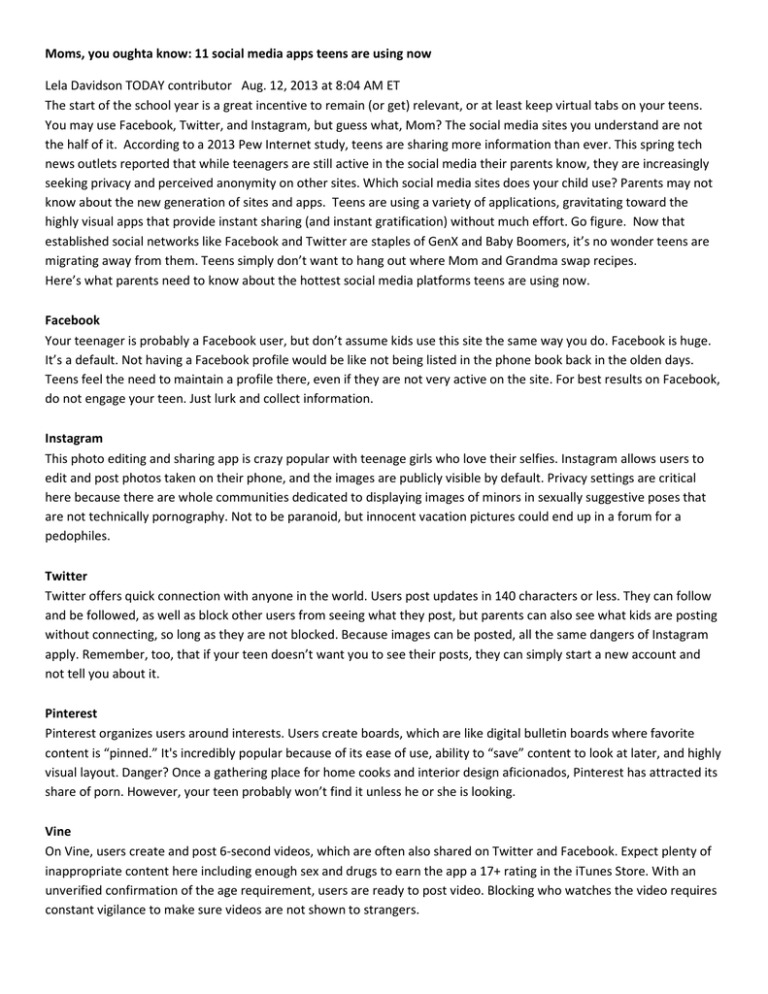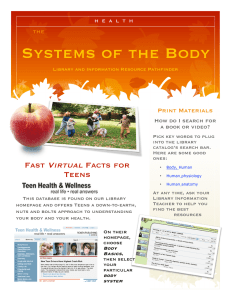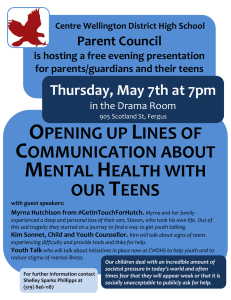Moms, you oughta know: 11 social media apps teens are... Lela Davidson TODAY contributor Aug. 12, 2013 at...
advertisement

Moms, you oughta know: 11 social media apps teens are using now Lela Davidson TODAY contributor Aug. 12, 2013 at 8:04 AM ET The start of the school year is a great incentive to remain (or get) relevant, or at least keep virtual tabs on your teens. You may use Facebook, Twitter, and Instagram, but guess what, Mom? The social media sites you understand are not the half of it. According to a 2013 Pew Internet study, teens are sharing more information than ever. This spring tech news outlets reported that while teenagers are still active in the social media their parents know, they are increasingly seeking privacy and perceived anonymity on other sites. Which social media sites does your child use? Parents may not know about the new generation of sites and apps. Teens are using a variety of applications, gravitating toward the highly visual apps that provide instant sharing (and instant gratification) without much effort. Go figure. Now that established social networks like Facebook and Twitter are staples of GenX and Baby Boomers, it’s no wonder teens are migrating away from them. Teens simply don’t want to hang out where Mom and Grandma swap recipes. Here’s what parents need to know about the hottest social media platforms teens are using now. Facebook Your teenager is probably a Facebook user, but don’t assume kids use this site the same way you do. Facebook is huge. It’s a default. Not having a Facebook profile would be like not being listed in the phone book back in the olden days. Teens feel the need to maintain a profile there, even if they are not very active on the site. For best results on Facebook, do not engage your teen. Just lurk and collect information. Instagram This photo editing and sharing app is crazy popular with teenage girls who love their selfies. Instagram allows users to edit and post photos taken on their phone, and the images are publicly visible by default. Privacy settings are critical here because there are whole communities dedicated to displaying images of minors in sexually suggestive poses that are not technically pornography. Not to be paranoid, but innocent vacation pictures could end up in a forum for a pedophiles. Twitter Twitter offers quick connection with anyone in the world. Users post updates in 140 characters or less. They can follow and be followed, as well as block other users from seeing what they post, but parents can also see what kids are posting without connecting, so long as they are not blocked. Because images can be posted, all the same dangers of Instagram apply. Remember, too, that if your teen doesn’t want you to see their posts, they can simply start a new account and not tell you about it. Pinterest Pinterest organizes users around interests. Users create boards, which are like digital bulletin boards where favorite content is “pinned.” It's incredibly popular because of its ease of use, ability to “save” content to look at later, and highly visual layout. Danger? Once a gathering place for home cooks and interior design aficionados, Pinterest has attracted its share of porn. However, your teen probably won’t find it unless he or she is looking. Vine On Vine, users create and post 6-second videos, which are often also shared on Twitter and Facebook. Expect plenty of inappropriate content here including enough sex and drugs to earn the app a 17+ rating in the iTunes Store. With an unverified confirmation of the age requirement, users are ready to post video. Blocking who watches the video requires constant vigilance to make sure videos are not shown to strangers. Reddit Reddit users submit links or text, which are voted up or down by other users. Content is ranked to determine the post’s position on the front page. All the content is organized into categories known as “sub-reddits.” This site is more popular with boys, who are using the app less as a social network than as a source of news and as a search engine. The forumlike interaction means your teen can “talk” to anyone. Tumblr Tumblr enables blogging for those afflicted with a short attention span. Of course, teens love it. Photo, audio, and video posts are often re-shared from other sites with very little text. Tumblr’s big attraction is the ability to create collections of media that quickly and powerfully express the poster’s personality. Beware of the anorexia communities popular on Tumblr glorifying images of frighteningly thin young girls and women. Kik Kik is a smartphone messenger system where users send videos and images instead of text. Think emojis on steroids. Teens love meme and Kik allows them to search for and share images, memes and YouTube videos. Parents might be surprised to see some of the jokes their teens are sharing, but there is no unique danger here. Snapchat Snapchat allows users to send messages, primarily photos and videos that are destroyed seconds after they have been received. This service is marketed to teens with “capture the moment” messaging, and plays on its contrast to Facebook, which archives every post and pic for years. Snapchat’s fleeting image feature offers users the illusion of anonymity, but screenshots can be taken. The biggest risk here is sending inappropriate content thinking it can’t be used against them. If your kids have the judgment of politicians, they could get into trouble. Pheed Pheed allows users to share all forms of digital content in 420 character or less. Teens are the primary users of Pheed, which is one of the top apps in the iPhone store. Each user gets their own channel where they can post their content publicly or privately. In addition to the social media aspects like Facebook, Pheed is a full service broadcast medium. Users can share audio tracks and live broadcasts. Your teenager could conceivably live-stream every waking moment on Pheed. I think we’ve all seen that episode of "Law & Order." Users can also charge for access to the channel. A profit motive and under-developed judgment? What could possibly go wrong? Wanelo Wanelo -- which stands for "Want, need, love" -- is Instagram-meets-shopping and the dream app of many teenage girls. Users post images of and links to products, which are then bought, saved, tagged and shared by other users. When enough users tag a product, a store page is created. Users can follow stores and get updates when new products from those stores are posted. Wanelo is a wonderful tool to find out exactly what your 14-year-old daughter wants for her birthday. Serious threats to your bank balance here. 4Chan 4chan is a simple forum platform. Anyone can post images on bulletin boards, and anyone can comment. Similar to Reddit, the boards are dedicated to a variety of topics, but here users do not need to create an account to participate in the community. Anonymity can create extremely hostile environments online, so if your teenager is using 4chan, you’ll want to have conversations about how to deal with virtual aggression.


